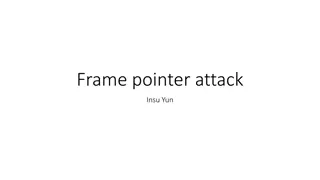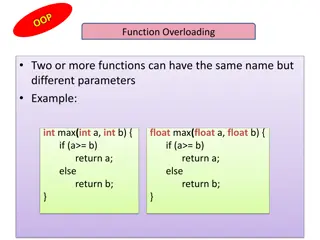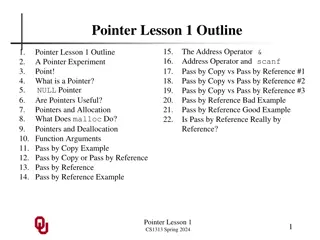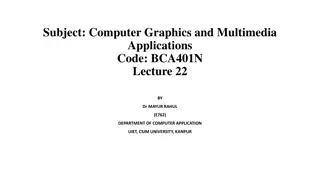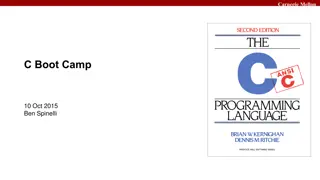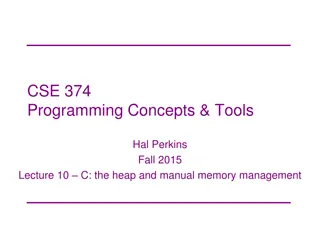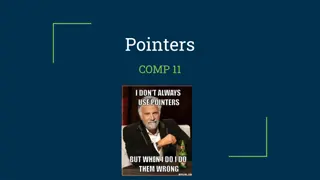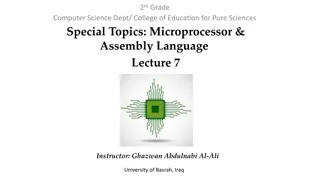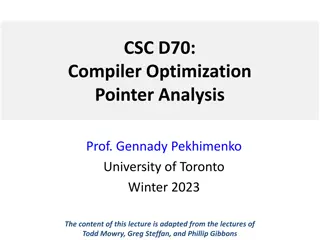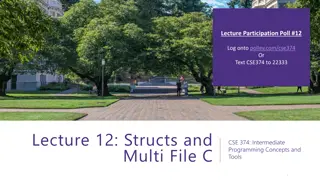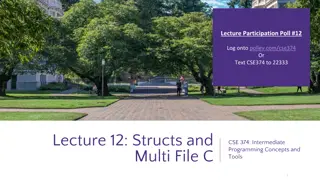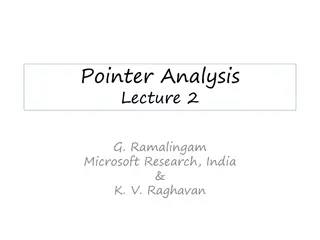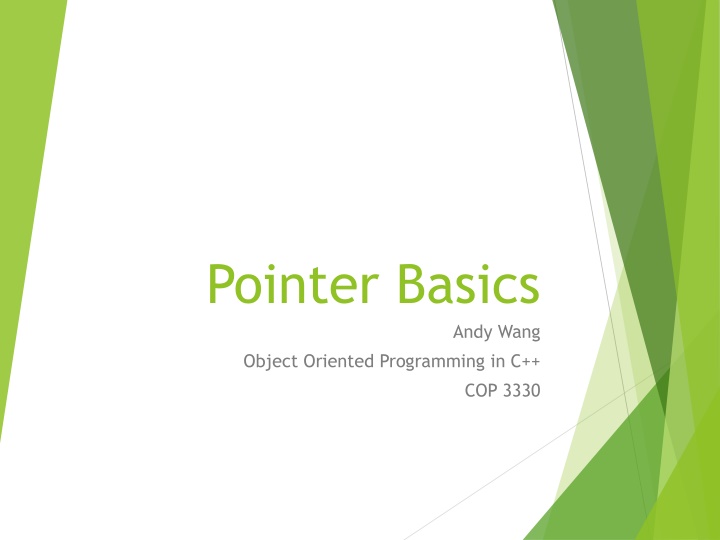
Pointers in Object-Oriented Programming using C++
Learn about pointers in C++: what they are, how to declare and dereference them, potential pitfalls, examples, and how to initialize pointers with null values or memory addresses. Master this fundamental concept for effective C++ programming.
Download Presentation

Please find below an Image/Link to download the presentation.
The content on the website is provided AS IS for your information and personal use only. It may not be sold, licensed, or shared on other websites without obtaining consent from the author. If you encounter any issues during the download, it is possible that the publisher has removed the file from their server.
You are allowed to download the files provided on this website for personal or commercial use, subject to the condition that they are used lawfully. All files are the property of their respective owners.
The content on the website is provided AS IS for your information and personal use only. It may not be sold, licensed, or shared on other websites without obtaining consent from the author.
E N D
Presentation Transcript
Pointer Basics Andy Wang Object Oriented Programming in C++ COP 3330
What is a Pointer? A variable that stores a memory address To declare a pointer use the * operator with the following format typeName *variableName; int n; int *p; // pointer to an int All pointers (memory addresses) have the same size. Thus, the type information is important to distinguish them from one another double *dptr; // pointer to a double char *cpt1; // pointer to a char float *fptr; // pointer to a flot
Note These three declarations are equivalent int *p; int * p; int* p; Tricky when declaring multiple variables int x, y, z; // three variables of type int int* p, q, r; // one pointer to int and two integers int *p, *q, *r; // three pointers to int
Pointer Dereferencing To access the target pointed by the pointer, we need to dereference the pointer with the unary * operator int *ptr; // a pointer to int ptr is a variable holding a memory address of an int *ptr dereferences the pointer, which points to the int Note When declaring a pointer, you need to use the * operator AFTER that, you use * only to dereferencing the pointer A pointer may not point to a valid target A pointer may not be initialized Can get runtime error message segmentation fault
Pointer Example http://www.cs.fsu.edu/~myers/c++/examples/pointers /pdeclare.cpp
Pointer Example #include <iostream> using namespace std; int main() { int *ptr1, *ptr2; double *dptr; cout << The value of ptr1 = << ptr1 << endl; cout << The value of ptr2 = << ptr2 << endl; cout << The value of dptr = << dptr << endl; // DANGEROUS! Deferecing uninitialized pointers cout << *ptr1 = << *ptr1 << endl; cout << *ptr2 = << *ptr2 << endl; cout << *dptr = << *dptr << endl; }
Initializing Pointers What can we assign to pointers at initialization time? Null Pointers of the same type Address of an variable of the same type
Null Pointer 0 is also known as the null pointer The only integer literal that may be assigned to a pointer int *p = 0; int *q; q = 0; // okay int *z; z = 900; // BAD! // okay A null pointer is never a valid target If you deference a null pointer, you will get a segmentation fault We use null instead of random memory addresses, so we know currently the pointer is not pointing to a valid target To check, do the following if (ptr != 0) cout << *ptr;
Null Pointer Example http://www.cs.fsu.edu/~myers/c++/examples/pointers /pnull.cpp
Null Pointer Example #include <iostream> using namespace std; int main() { int *ptr; cout << The value of ptr = << ptr << endl; cout << Now initializing ptr to null pointer << endl; ptr = 0; cout << The value of ptr = << ptr << endl; if (ptr == 0) cout << Pointer unsafe to dereference << endl; else cout << Pointer is safe to dereference << endl; cout << Attempting to dereference ptr << endl; cout << *ptr = << *ptr << endl; }
Pointers of the Same Type Legal to assign pointers of the same type int *ptr1, *ptr2; ptr1 = ptr2 // okay Although all pointers are addresses, different types of pointers are treated differently Automatic type coercisons do not apply int *ip; char *cp; ip = cp; // ILLEGAL To force a coercion, perform an explicit cast ip = reinterpret_castint<int *>(cp) // better know what you // are doing
The Address of Operator Recall the unary operator &, applied to a variable, gives its address int *ptr; int num; ptr = # // assign the address of num to ptr
Address of Operator Example http://www.cs.fsu.edu/~myers/c++/examples/pointers /pinit.cpp
Address of Operator Example #include <iostream> using namespace std; int main() { int *ip1, *ip2; double *dp1, *dp2; char *cp1, *cp2; int x = 5; double a = 1.1; char ch = $ ; ip2 = &x; dp2 = &a; cp2 = &ch;
Address of Operator Example cout << ip2 = << ip2 << \t &x = << &x << endl; cout << dp2 = << dp2 << \t &a = << &a << endl; cout << cp2 = << cp2 << \t &ch = << &ch << endl; cout << cp2 = << reinterpret_cast<void *>(cp2) << \t &ch = << reinterpret_cast<void *>(&ch) << endl << endl; Would try to print a null terminated char string cout << *ip2 = << *ip2 << \t x = << x << endl; cout << *dp2 = << *dp2 << \t a = << a << endl; cout << *cp2 = << *cp2 << \t ch = << ch << \n\n ; ip1 = ip2; dp1 = dp2; cp1 = cp2;
Address of Operator Example cout << ip1 points to << *ip1 << endl; cout << dp1 points to << *dp1 << endl; cout << cp1 points to << *cp1 << endl; /* */ // ATTEMPTING ILLEGAL OPERATIONS ip1 = cp1; dp1 = ip1; cp1 = &a;
Address of Operator Example dp1 = reinterpret_cast<double *>(ip2); ip1 = reinterpret_cast<int *>(dp2); cout << ip1 points to << *ip1 << endl; cout << dp1 points to << *dp1 << endl; cout << \nip2 = << ip2 << endl; cout << &*ip2 = << &*ip2 << endl << endl; } cout << x = << x << endl; cout << *&x = << *&x << endl; return 0;
Array Variables and Pointer Variables Array variable is just a kind of a pointer variable, pointing to the first indexed variable of the array int a[10]; int *p, *p2 = 0; Since both are pointers, it is okay to do the following p = a; // p points to the starting location of a[10] Thus p[0] is the same as a[0] However, the following is illegal a = p2; // ILLEGAL The type of a is const version of int *, which cannot be changed

